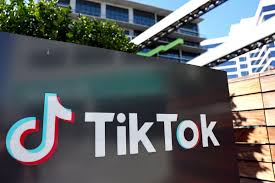Following being confirmed as Ireland’s prime minister-in-waiting in March, Simon Harris took to TikTok, a medium he preferred, to express himself.
The guy who will be Ireland’s youngest Taoiseach described to his 95,000 followers how he went from being a “opinionated, moody teenager” who was upset about his brother’s autism not receiving proper educational support in a video that had the words “THANK YOU” printed in yellow letters.
Dubbed the “TikTok Taoiseach” at times, Harris is one of the leading European politicians promoting the social media site controlled by China, reasoning that the desire to connect with younger voters takes precedence over security concerns.
Mainstream politicians are reluctant to give ground to fringe parties that have effectively tapped into the short video format, especially as European elections draw near in June.
However, TikTok is coming under more and more attention in the West because of worries that user data from the ByteDance app, which is owned by a Beijing-based corporation, might find its way into the hands of the Chinese government.
For example, Germany’s security services have advised against using the app due to worries that it would share data with China’s government or be used to sway users.
TikTok claims that security alerts are not necessary and that it doesn’t gather any more data than other apps.
It hired a third-party security company to monitor data movements and created a site last year in Dublin to keep the data of European customers in an attempt to allay fears.
Both ByteDance and the Chinese government have denied intending to use the programs for espionage.
In March 2021, Harris, 37, was an early adopter. He created films that included anything from a 60-second budget review set to music to clips of him brewing tea while watching football.
Another was Emmanuel Macron, the president of France, who joined TikTok in 2020 and now has 4 million followers.
Senior politicians’ adoption of TikTok in Germany is a relatively recent development; in March, Health Minister Karl Lauterbach became the nation’s first minister to create an account.
“Revolution at TikTok: it starts today,” he stated.
Regarding the far-right Alternative for Germany (AfD) party, which has risen to become the second most popular party in Germany, he stated, “We cannot leave social media to the AfD”.
German Chancellor Olaf Scholz, who started his own TikTok account and declared on X that he “won’t dance, I promise”, joined him on Monday.
His debut TikTok video had the following caption, which was accompanied by oddball music: “We are just as surprised as you are! (And yes, the Chancellor really is on TikTok now)”
The top ministers of Germany have a well-established social media presence. For instance, Scholz, Lauterbach, and the ministers of finance, economics, and foreign policy all have Instagram profiles.
The June European elections will allow 16-year-olds in Germany to vote, making it more important to reach out to young voters.
PANICK AMONGST MAINSTREAM PARTIES.
The AfD is the most prominent German party on TikTok. With 411,000 members, the party has Maximilian Krah as its front-runner.
“So all the other democratic parties are kind of panicking at the moment not to leave this important platform and the young demographic, the young voters, to this radical party,” said Johannes Hillje, a political strategist.
In a particular video, Krah exhorts students to challenge left-wing educators. Another witnesses him giving young guys dating advise, advising them not to view porn or support the Green Party. “Real men are right-wing, real men have ideals, real men are patriots.”
The problem for mainstream politicians who aspire to match such reach is that they are wary of utilizing a platform from a nation with an autocratic government.
Even though Lauterbach acknowledges TikTok’s success, he admitted that he can have doubts about the app. “I don’t give the platform any legitimacy by using it,” he stated. He purchased a different phone for use on TikTok in order to stop data leaks.
Macron’s staff adds that the French president views the necessity for regulation and the utility of TikTok as two different matters. According to an adviser who did not want to be identified, “We cannot ignore this population, the vast majority of whom do not watch television news or read the press,” Reuters was informed.
The amount of security worry was demonstrated last year when TikTok was prohibited from government employees’ work phones in Austria and Britain.
But it’s getting more difficult to ignore TikTok. According to a Reuters Institute for the Study of Journalism survey from the previous year, more people are turning to TikTok for news and less people are trusting traditional media.
Twenty percent of 18 to 24 year olds use TikTok, the social network with the fastest growth rate according to the survey, for news.
Defence Secretary Grant Shapps is the most senior minister in the United Kingdom who has a substantial online profile on TikTok.
Shapps replied to the news of the TikTok ban on government devices by posting a scene from the 2013 movie “Wolf of Wall Street,” in which Leonardo DiCaprio’s character Jordan Belfort says, “I’m not fucking leaving.”
Shapps continued by saying the prohibition made sense and that he had never used TikTok on official equipment.
Politicians circumvent Belgium’s restriction on ministers and civil officials installing TikTok on official devices by using the software on unaffiliated devices.
Politicians from the co-ruling Green party use smartphones that are only connected to 4G and have no other apps loaded to post TikTok videos; their staffs own the phones instead of the politicians themselves.
A Green party representative told Reuters, “We don’t want to leave the field to the far-left or the far-right. That is another reason we are on TikTok.”
“Young people get news through social media and TikTok is one of the biggest platforms. Some politicians are comfortable with that, others are not.”







